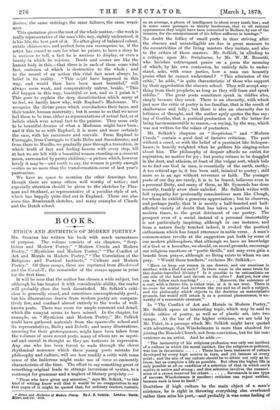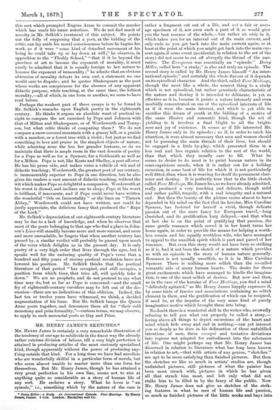BOOKS.
ETHICS AND ESTHETICS OF MODERN POETRY.*
Ma. SELKIRK has written his book with much earnestness of purpose. The volume consists of six chapters, "Scep- ticism and Modern Poetry," "Modern Creeds and Modern Poetry," "Mysticism and Modern Poetry," "The Conflict of Art and Morals in Modern Poetry," "The Correlation of the Religions and Poetical Instincts," "Culture and Modern Poetry." Of these essays, three are reprinted from Blackwood and the Conthin; the remainder of the essays appear in print for the first time.
It will be seen that the author has chosen a wide subject, but although he has treated it with considerable ability, the reader will probably close the book dissatisfied. Mr. Selkirk's criti- cism is generally sound, and sometimes unexceptionably good; but his illustrations drawn from modern poetry are compara- tively few, and confined almost entirely to the works of well- known poets. There was room for ample comment and detail, which the essayist seems to have missed. In the chapter, for example, on "Mysticism and Modern Poetry," Mr. Selkirk could have gathered materials from the spasmodic school and its representatives, Bailey and Dobell ; and many illustrations, amusing for their grotesqueness, might have been taken from the volumes of more recent poets, many of whom are as mysti- cal and unreal in thought as they are tortuous in expression. Any one who has been forced to wade through the clever rhythmical nonsense which these young poets mistake for philosophy and culture, will see how readily a critic with some sense of the ludicrous might make use of verse so eminently characteristic of the time. The effort to say something great or something original leads to strange inversions of syntax, to a contempt for grammar and a neglect of literary propriety :—
"Those who have given any attention," says Mr. Selkirk, "to this kind of writing know well that it would be no exaggeration to say that pages of it might be quoted that, for ordinary readers, contain, • Ethics and Xstketics of Modern Poetry. By 3. B. Selkirk. London: Smith, Bider, and Co. 1878. on an average, a gleam of intelligence in about every tenth line; and in some cases passages so utterly incoherent, that to all rational appearances they might have been concocted in Bedlam, by one of the inmates, for the entertainment of his fellow-sufferers in bondage."
No doubt the follies of small poets in thus striving after
the obscure and unintelligible are due in great measure to' the eccentricities of the living masters they imitate, and also to the critics of those masters. Mr. Selkirk, in alluding to a critique upon Mr. Swinburne, by Mr. W. M. Rossetti, who lavishes extravagant praise on a poem the meaning of which, by his own confession, he entirely fails to under- stand, asks, with some justice, how a man can honestly praise what he cannot understand ? "This admission of the critic," he adds, "is quite characteristic of those who support by their approbation the obscure school. They will accept any- thing from their prophets, as long as they will foam and speak riddles." The great poets sometimes speak in riddles also, simply because they must. There is an obscurity, with which just now the critic of poetry is too familiar, that is the result of shallowness and folly; but there is also an obscurity due ta loftiness of thought, and the author aptly quotes the fine say- ing of Goethe, that a poetical production is all the better for being incommensurable to reason,—a saying, by the way, which was not written for the solace of poetasters.
Mr. Selkirk's chapters on " Scepticism " and "Modern Creeds" contain a good deal of incisive criticism. The poet without a creed, or with the belief of a pessimist like Schopen- hauer, is heavily weighted when he gathers his singing-robes about him. The philosophy of despair affords no outlet for aspiration, no motive for joy ; but poetry refuses to be draggled in the dust, and atheism, at least of the vulgar sort, which bids us to find our God in man, is essentially of the earth, earthy. A too critical age is, it has been said, inimical to poetry ; still more so is an age without reverence or faith. The younger poets of our day are rarely, it is to be feared, believers even in a personal Deity, and many of them, as Mr. Symonds has done recently, frankly avow their unbelief. Mr. Selkirk writes with full sympathy for profoundly conscientious men like Clough, for whom he exhibits a generous appreciation ; but he observes, and perhaps justly, that it is mostly a half-hearted and half- affected variety of doubt that has taken a poetical form in modern times, to the great detriment of our poetry. The prospect even of a social instead of a personal immortality is not particularly inspiring, although in one instance, and from a nature finely touched indeed, it evoked the poetical enthusiasm which has found utterance in noble verse. A man's common-sense revolts at the suggestion put forth by some of our modern philosophers, that although we have no knowledge of a God or a hereafter, we should, on moral grounds, encourage our religious emotions or "poetic thrills," and may even gain a benefit from prayer, although no Being exists to whom we can pray. "Would these teachers," exclaims Mr. Selkirk,—
" Have us keep our reason in one drawer, and our emotions in another, with a God for each ? Is there room in the same brain for this double-barrelled divinity ? Is it possible to be rationalistic on one side of the head and devout on the other ? And yet, how else- can we follow such teaching ? Moreover, the existence of a soul, with a future life, is either true, or it is not true. There is- no room for mortal foot between the yes and no of such a subject, and the philosophy which objects to the doctrine on materialistic grounds, but would still retain it as a poetical phenomenon, is un- worthy of a reasonable creature."
In "The Conflict of Art and Morals in Modern Poetry," Mr. Selkirk opens an interesting topic, which may be said to divide critics of poetry, OS well as of plastic art, into two camps. At the bar of the higher criticism, we are told by Mr. Pater, in a passage which Mr. Selkirk might have quoted with advantage, that Winckelmann is more than absolved for joining the Romish Church, not from conviction, but for his con- venience as an artist. And he adds :— "The insincerity of his religious profession was only one incident of a culture in which the moral instinct, like the religions or political,.
was lost in the artistic There have been instances of culture developed by every high motive in turn, and yet intense at every point ; and the aim of our culture should be to attain not only as in- tense, but as complete a life as possible. But often the higher life is only possible at all on condition of a selection of that in which one's motive is native and strong ; and this selection involves the renunci- ation of a crown reserved for others Savonarola is one type- of success, Winckelmann is another ; criticism can reject neither, because each is true to itself."
Doubtless if high culture be the main object of a man's existence, he is right in throwing everything else overboard rather than miss his port,—and probably it was some feeling ot
this sort which prompted Eugene Aram to commit the murder which has made his name notorious. We do not find much of novelty in Mr. Selkirk's treatment of this subject. He points out the folly of supposing that a poet, at the bidding of the critic, can lay aside his moral consciousness before he begins his work, as if it were "some kind of detached movement of his being he could take up or lay down at will ;" he observes, in opposition to the "Fleshly School," "that if it be beyond the province of art to become the exponent of morality, it must surely be admitted that it is equally foreign to her nature to become the exponent of immorality ;" he admits that an obvious obtrusion of morality defeats its own end, a statement no one would care to dispute ; and he quotes Shakespeare as the poet whose works are conspicuous for the absence of any apparent didactic purpose, while teaching, at the same time, the loftiest morality,—all of which, in one form or another, we seem to have read before.
Perhaps the weakest part of these essays is to be found in Mr. Selkirk's remarks upon English poetry in the eighteenth century. He thinks it argues an absolute want of poetical in- sight to compare the art exercised by Pope and Johnson with that of Milton and Shakespeare, or of Wordsworth and Tenny- son, but what critic thinks of comparing them ? We do not compare a snow-covered mountain with a grassy hill, or a prairie with a meadow, or a forest tree with a violet; but just as we find something to love and praise in the simplest objects of nature, while admiring none the less her grander features, so do we maintain that there is ample room in the vast domain of poetry for a Pope as well as for a Spenser, for a Goldsmith as well as for a Milton. Pope is not, like Keats and Shelley, a poet all over. He has his prose side, and makes verse a vehicle of wit and of didactic teaching ; Wordsworth, the greatest poet of our century, is immeasurably superior to Pope in one direction, but he also gives his readers a vast amount of didactic teaching, without the wit which makes Pope so delightful a companion. Wordsworth at his worst is dismal, and inclines one to sleep ; Pope at his worst is brilliant, if inaccurate, and if Pope could never have written the wonderful "Ode on Immortality" or the lines on "Tinter Abbey," Wordsworth could not have written, nor could he justly appreciate, the delicious fancy that produced the "Rape of the Lock."
Mr. Selkirk's depreciation of our eighteenth-century literature may be due to a lack of knowledge, and when he observes that most of the poets belonging to that age who find a place in John- son's Lives will steadily become more and more unread, and more and more unreadable, he forgets that when another century has passed by, a similar verdict will probably be passed upon much of the verse which delights us in the present day. It is only poetry of a very high order that lives through the ages, but it speaks well for the enduring quality of Pope's verse that a hunched and fifty years of stormy poetical revolution have not lowered his position. Mr. Selkirk thinks that the poetical literature of that period "has occupied, and still occupies, a position from which time, that tries all, will quickly take it down." We are no prophets, and do not pretend to say what time may do, but as far as Pope is concerned—and the small fry of eighteenth-century versifiers may be left out of the dis- cussion—there are no indications of this oblivion. Indeed, the last ten or twelve years have witnessed, we think, a decided augmentation of his fame. But Mr. Selkirk lumps the Queen Anne poets together, and denounces them all for "their dold monotony and prim formality,"—curious terms, we may observe, to apply to such mercurial poets as Gay and Prior.



































 Previous page
Previous page